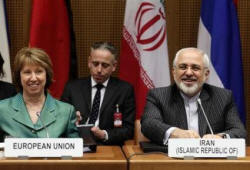|

World
powers and Iran resume nuclear talks, eyeing Ukraine
 Send a link to a friend
Send a link to a friend
[March 19, 2014]
VIENNA (Reuters) — World powers and
Iran began the second day of talks in Vienna on Tehran's contested
nuclear programme on Wednesday, with Western and Iranian diplomats
saying the Ukraine crisis has not complicated their efforts so far.
|
|
 The meeting is the second in a series that Western governments — the United States, France, Britain and Germany — as well as China
and Russia hope will culminate in a broad settlement of the
decade-old dispute that threatens to draw the Middle East into a new
war. The meeting is the second in a series that Western governments — the United States, France, Britain and Germany — as well as China
and Russia hope will culminate in a broad settlement of the
decade-old dispute that threatens to draw the Middle East into a new
war.
The talks are seeped in mutual mistrust and years of adversity, and
tensions between Moscow and Western capitals over Crimea could
further strain diplomacy, because Russia has in the past differed
with the West in their approaches towards Tehran.
Iran's top nuclear negotiator Abbas Araqchi said that the crisis in
Ukraine — the worst confrontation between the West and the East
since the Cold War — had so far had "no impact" on talks with the
six nations.

"We also prefer the (powers) to have a unified approach for the sake
of negotiations," he told reporters late on Tuesday, noting that the
first day of talks was "positive and very good".
A spokesman for European Union foreign policy chief, Catherine
Ashton, who coordinates diplomacy with Iran on behalf of the six,
said that the powers were working in a "unified fashion".
Araqchi also said that the next round of talks were expected to be
held in the Austrian capital on April 7-9.
In the past, Russia has generally enjoyed warmer ties with the
Islamic Republic and suggested Western fears about any nuclear
weapons designs by Tehran are overblown.
[to top of second column] |

As in previous meetings, Deputy Foreign Minister Sergei Ryabkov
represented Russia at the talks, which were expected to end late in
the day.
Iran denies Western suspicions that its nuclear work has any
military aim and wants the West to lift crippling economic sanctions
as part of the final deal.
The six powers want Iran to curtail its nuclear programme to a point
where they would feel secure it could not produce bombs.
(Reporting by Justyna Pawlak, Parisa Hafezi, Fredrik Dahl and Louis
Charbonneau in Vienna; editing by Louise Ireland)
[© 2014 Thomson Reuters. All rights
reserved.] Copyright 2014 Reuters. All rights reserved. This material may not be published,
broadcast, rewritten or redistributed.

 |